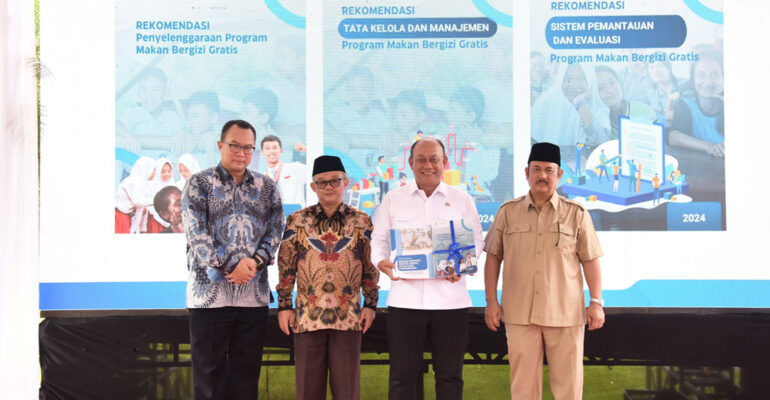IPB University becomes the National Center of Excellence for the Free Nutritious Meal Program

IPB University is trusted by the Government of Indonesia to succeed the Free Nutritious Meal Program (MBG) through the establishment of a National Center of Excellence (CoE).
Located in the Agribusiness and Technology Park (ATP) area of IPB University, this CoE will be a special place to develop and test innovative protocols to overcome various challenges and new needs of the MBG program.
This CoE is the result of a multi-stakeholder collaboration between IPB University, the Ministry of National Development Planning/National Development Planning Agency (Ministry of PPN/Bappenas), the National Nutrition Agency (BGN), and the United Nations International Children’s Emergency Fund (UNICEF).
Rector of IPB University, Prof Arif Satria expressed his gratitude for the trust of Bappenas, BGN, and UNICEF which established IPB University as a CoE for the MBG program.
This trust adds to the list of achievements of IPB University, having previously been appointed as the Inter-University Center of Excellence for Resilient Food Security to Climate Change.
“IPB University is always committed to optimizing the role of lecturers as researchers, trainers, and innovators, as well as utilizing laboratory facilities in various faculties, departments, and study centers to support the success of the MBG program,” he said during the opening of the establishment and groundbreaking of CoE at ATP IPB University (11/2).
He said that IPB University was ready to collaborate with various parties, including Village-Owned Enterprises (BUMDes), cooperatives, and farmer groups, in building a food supply ecosystem.
“IPB University will also develop a kitchen model based on local characteristics, enrich the MBG nutrition menu, and innovate with various related stakeholders,” he said.
Minister of National Development Planning/ Chief of Bappenas, Prof Rachmat Pambudi said that the Free Nutritious Meal program was an initiative of President Prabowo Subianto for a long time, even long before he served as the number one person in Indonesia.
He said that Prabowo’s concern for the health of children, pregnant women, and the future of the nation’s generation prompted him to initiate this program. Eventually, the MBG program became a top priority for the current government.
“This program can save pregnant women and babies and plays an important role in building a healthier and smarter Indonesia. In addition, the impact extends to the economic sector which can encourage the growth of MSMEs, increase demand for agricultural and fishery products, and create new jobs,” he said.
Prof Rachmat also emphasized the importance of regular monitoring, evaluation, impact studies, and data integration in program development. Therefore, he hopes this CoE can be an integral part of these efforts.
“Therefore, Pak Rector, we really hope that this CoE can be established and become an integral element in the development of future programs,” he said.
On this occasion, Chief of the National Nutrition Agency, Dr Dadan Hindayana said the importance of nutrition intervention in building the quality of Indonesia’s human resources.
He revealed that 60% of Indonesian children have never consumed a complete nutritious diet, including protein, vegetables, fruit, and milk.
“Many think children don’t drink milk because of lactose intolerance, when in fact they can’t afford it. Evidence shows that after regularly consuming milk for more than a year, their health condition is actually getting better,” he said.
Dr Dadan continued by saying that nutrition from the first 1.000 days of life can play a role in brain development and prevent stunting. In addition, nutritional interventions for school children and adolescents are essential to ensure optimal physical growth.
“With this strategy, Indonesia is targeting a golden generation of 2045 that is not only smart, but also healthy and strong,” he said.
UNICEF Indonesia Representative, Maniza Zaman, who attended the event, presented data on the condition of children in Indonesia. “Data in Indonesia shows that 5 million children (21,5%) are stunted, 2 million children (8,5%) are malnourished, and 1 million children (4,2%) are overweight.
In addition, only 61% of children aged 6-23 months consume foods with the recommended nutritional diversity, while the other 39% have not received adequate nutrition (malnutrition).
“Malnutrition will have short and long term impacts, ranging from health and learning ability. Therefore, the Free Nutritious Meal program can be an accelerator in multisectoral efforts to overcome malnutrition in Indonesia,” he said. (dr) (IAAS/RUM)



